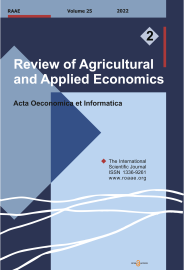KEYWORDS:
Bt cotton, seed price reductions, policy
DOI NUMBER:
10.15414/raae.2014.17.02.88-91
ABSTRACT:
In 2006 the state government of Andhra Pradesh reduced the Bt cotton seed prices from Indian Rs1600 to Rs750 in order to make the technology affordable and accessible to small and marginal farmers in the state and also to prevent the monopolistic market structure in the seed market. The drastic reduction in seed prices, on the other hand could affect the profitability of seed providing companies and curb their incentives to innovate in future. Recent literature has also examined the impact of price controls on diffusion of technology, revenue and profitability of seed providers. It suggests that price controls have positively impacted the diffusion of technology in India, and were also successful in increasing the revenue of seed providers in the short run. However, the impact of price controls on profitability would depend on cost conditions. In the light of the above discussion, this article attempts to discuss the debate behind price controls and draws certain policy implications pertaining to pricing of Bt seeds, which has an international policy relevance.
Please Cite this Article as:
Anchal ARORA (2014) Pricing Of Bt Cotton Seeds In India: The Debate Behind. Review of Agricultural and Applied Economics. XVII (Number 2, 2014): 88-91. doi: 10.15414/raae.2014.17.02.88-91
URL for sharing:
https://roaae.org/1336-9261/doi/abs/10.15414/raae.2014.17.02.88-91
FULL TEXT PDF:
▼ direct download link| view online in fullscreen ▲

